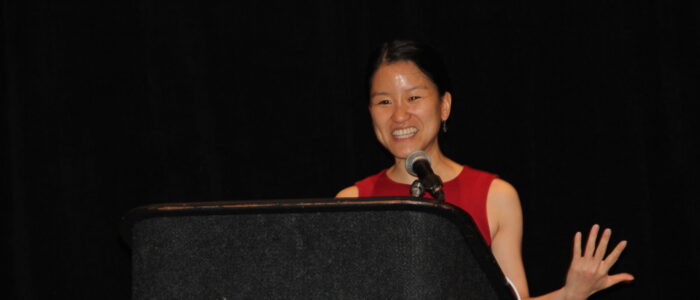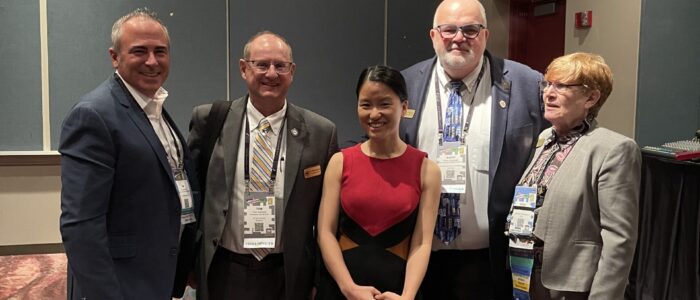Thousands of board members, school administrators, school leaders and others dedicated to advancing the education of all children gathered at Workshop 2024, Oct. 21-24, in Atlantic City.
The New Jersey School Boards Association teamed up with the New Jersey Association of School Administrators and the New Jersey Association of School Business Officials on the event, which Dr. Timothy Purnell, executive director and CEO of the NJSBA, called one of the most successful Workshops ever.
In addition to getting the opportunity to connect with hundreds of exhibitors, attendees learned from education experts who highlighted an array of topics critical to student success, such as literacy, learning acceleration, school security, artificial intelligence, school finance, enhancing board operations and more.
Marita Cheng, the founder of Robogals, Aipoly and Aubot (pronounced “our-bot”), was the first keynote speaker to take the stage.
A native of Australia, she grew up in an isolated area in Queensland in a city that had about 90,000 people.
As a youth, she was deeply inspired by the founders of Apple.
“As a teenager growing up, it made me very excited that these guys were just a few years older than me and didn’t have much more education or more money … they just had a lot of enthusiasm, they had their ideas and a lot of grit – and they worked very hard to make their ideas happen and create amazing companies,” she said.
She joined engineering camp in high school and learned that as an engineer, she could travel the world, work on exciting projects and impact the lives of millions of people. “But my mom thought I should do medicine because I am Asian,” she said.
But she followed her heart and pursued a career as an engineer. “Out of my graduating class, only three girls studied engineering right out of high school,” she said.
Convinced that more girls should be encouraged to become engineers, she founded Robogals and recruited others to join the club. The club became a movement and now has 35 chapters spanning the globe.
Cheng went on to share how she founded Aipoly, which uses artificial intelligence to help the visually impaired, and Aubot, which makes telepresence robots.
She shared advice on how to help students succeed and achieve their goals.
“The first time you do something it is difficult and hard,” she said. “But once you have done something once, you know what you are doing … and you can make it better the next time.”
The Inspiring Story of John Quiñones
On Tuesday, Workshop attendees had the privilege to listen to John Quiñones, a longtime ABC journalist who has been a correspondent for 20/20, Nightline and Good Morning America. He is also the longtime host of the popular series, “What Would You Do?” The show uses hidden cameras to shine a spotlight on how everyday people react to challenging situations.
Purnell noted that the life story of Quiñones is a shining example of how education can be critical “in opening up a world of opportunities” for students. He applauded Quinones for spending his life “never taking no for an answer,” which led him from being a migrant farm worker to enjoying a more than 40-year career in network television news. As the host of “What Would You Do?”, Quiñones has “literally become the face of doing what is right for millions of fans,” Purnell said.
Quinones began his speech by thanking everyone for all the work they do to advance the education of children.
“All I ever wanted to do was tell my stories,” he said. “The thing I love about my profession — journalism – is I get to shine a light on issues a lot of people don’t want to talk or hear about.”
Speaking about “What Would You Do?” he said the show focuses on injustice and how people react when they witness it in the making. “Do you step away or do you step in … what would you do?” he asked the crowd.
“Young people face these dilemmas every day,” he said. “Some of our biggest fans are high school students and even elementary students,” he said.
Children can teach adults a lot about the difference between right and wrong, he said. “In the end, silence is complicity,” he said. “We have to raise our voices in this country more than ever before because these are tough, divisive times in America,” he said.
While people may disagree on issues such as immigration, he asked, “Why can’t we do that with decency and respect?”
As far as how people respond to various scenarios, he said, “I think it starts in the home. Very often, children learn to discriminate or to bully or to think they are better than others while they are growing up.”
He observed that through his hidden camera show, he has learned that it is often those who have been marginalized themselves who step in to help others.
Then, he went on to share how his family became migrant farm workers after his father was laid off from his job as a custodian at a high school. As a youth, Quiñones and his family members picked cherries for 75 cents a bucket and tomatoes for 35 cents a bushel.
It was his father who asked him if he wanted to do that type of back-breaking work every day or get an education. A program called Upward Bound allowed Quiñones to see what life was like as a college student while he was still in high school, and he credits it for helping him change his trajectory.
While there were times that Quiñones felt he’d never realize his dream of becoming a professional storyteller, he pressed on. After getting into and graduating from the Columbia University Graduate School of Journalism, his fortunes changed – and now he’s one of the most popular television correspondents in the world.
One of the career lessons that stayed with him came from the late Peter Jennings, who Quiñones credits as one of his most significant mentors.
Once, when an interview with a world leader fell through for Quiñones, Jennings told him that it would not be the first time someone failed to deliver on a promise. “Don’t worry so much about talking to the movers and shakers of the world … whenever they have a message to get out, they have people who handle it,” he recalls Jennings telling him. “Concentrate on talking to the moved and the shaken.”
Those words have stuck with Quinones, and they have served him well in telling stories that matter.
Acting Commissioner Focuses on Student Achievement
Kevin Dehmer, the acting commissioner of the New Jersey Department of Education, delivered a keynote address on Tuesday.
“We are all here for the same reason: our commitment to education and our children and to our future,” he said.
As someone who has served as acting commissioner on two other occasions, he noted that he has been marching in lockstep with board members and education leaders through challenge after challenge over the years.
Back in 2008, Dehmer thought that the Great Recession would be the single biggest event of his lifetime. “And I was wrong,” he said.
But whether it has been a hurricane or “super storm,” or a global pandemic, board members and school leaders have gotten through every challenge “stronger and more resilient,” he said.
Dehmer spent a portion of his keynote focusing on literacy, which he said is a challenge throughout the country in the aftermath of the COVID-19 pandemic. He outlined how Gov. Murphy is seeking to improve literacy outcomes.
The NJDOE recently received a $50 million grant to be doled out over five years from the U.S. Department of Education to support literacy, he said.
“Now we have additional resources to push us ahead even further in our literacy initiatives,” he said, adding that school districts will get the opportunity to apply for individual grants as a result of the funding.
Other literacy initiatives include getting back to the phonics system in terms of how we teach children to read, RAPID (for K-3) and RAPID+ (for students in grades 4 to 6). He also highlighted the updated New Jersey State Learning Assessment for English language arts.
New Jersey’s high-impact tutoring program, which has served about 50,000 students in 300 school districts, has made inroads in helping accelerate learning, he shared.
The expansion of full-day preschool to districts throughout the state was another area of focus, with Dehmer emphasizing how “the foundation of literacy must begin with those youngest learners.” He added, “Research has found that children who attend preschool are more likely to achieve in later grades.”
New Jersey has dedicated $120 million of its COVID funding for preschool expansion initiatives statewide, he noted.
On the subject of artificial intelligence, he observed that it poses tremendous opportunities but also carries “a lot of risk.” He added, “So, we need to navigate this carefully.”
The NJDOE is exploring how to build out its AI tools and make them usable to school districts throughout the state, Dehmer said.
“We can train (AI) on our content alone, so it is not mired in all the gunk on the internet,” he said. “We can make sure it is on point and built on information available only on our website.”
But no matter how much the state invests in academic initiatives, they will fall short if we do not collectively focus on the emotional and mental well-being of students, Dehmer said.
“Kids struggle with stigma and may not know who to turn to,” he said, observing that over the last two years, there has been an increase in HIB complaints. Substance abuse and chronic absenteeism remain problems, he said.
“Mental health screening needs to become as common as some of the other screening we do,” he said. “Certainly, I hope that one day students feel comfortable enough accessing this care like they do going to a nurse’s office because they have a paper cut.”
Another challenge Dehmer addressed was the continuing teacher shortage.
Fewer students are entering teacher preparation programs and the teachers that do enter the profession often leave before hitting the five-year mark, he said.
He outlined the NJDOE’s efforts in trying to ease the shortage, such as eliminating the EdTPA, waiving the fee to new teacher certifications, studying how to make teacher evaluations less stressful and holding up teaching as a profession with the Teach Inspire New Jersey campaign.
On the subject of school funding, fully funding the formula for the first time is a big deal, he said. “Just a few years ago, it seemed like a pipe dream,” he said.
He acknowledged that “full funding is not something universally adored in this state” as it can be challenging for school districts that have lost funding to move forward. “The governor and I have both committed to making tweaks and improvements in the formula,” he said.
“If we keep working together and collaborate and stick together, we are going to get it done,” Dehmer said.
Legislative Panel Participants Tackle Tough Topics
Co-hosted by the Garden State Coalition of Schools, the NJSBA Governmental Relations Department led a moderated panel discussion on various educational issues with representatives of the New Jersey State Legislature.
Panelists included:
- Sen. Vin Gopal (D-11), Senate Education Committee, Chair.
- Sen. M. Teresa Ruiz (D-29), Senate Majority Leader.
- Sen. Jon Bramnick (R-21).
- Assemblywoman Pamela Lampitt (D-6), Assembly Education Committee, Chair.
- Assemblyman Erik Simonsen (R-1), Assembly Education Committee, Member.
Chanta L. Jackson, vice president for legislation/resolutions at NJSBA introduced the legislators before handing it over to Jonathan Pushman, the Association’s senior director of advocacy, who moderated a lively panel discussion.
“The less talking I have to do, the more entertaining this session will be,” Pushman quipped.
In her opening remarks, Lampitt said, “Our collective job is to keep New Jersey’s schools the best in the country, producing the best and the brightest – and that means ensuring they have qualified teachers” – as well as engaged families that are supportive of local school boards and schools in general, she said.
One of the issues Gopal shined a spotlight on is the teacher shortage. He also observed that special education costs continue to go up, posing a challenge for smaller school districts.
“We are going to do everything we can to try to give you some relief and to make sure Trenton is not the problem,” Gopal said.
Simonsen stressed the need to help English language learners and not ignoring how extracurricular activities can help students.
Being a board of education member is “the toughest job in the state of New Jersey,” Bramnick said. He added, “Thank you very very much for serving for no pay and taking the heat you take.”
The state of education in New Jersey and throughout the country is “in crisis,” Ruiz said, referencing the fact that so many elementary school students are not meeting literacy expectations.
While some like to say that New Jersey has the best public schools, she said she wants the state to be number one in closing the achievement gap.
She also noted that too many school buildings are in dire need of updating.
On the teacher shortage, she said, “I don’t understand why we have not just eliminated the residency for people who want to come into this state and teach.” She added, “There is a lot to be celebrated but a lot of work to be done.”
In moderating the discussion, Pushman began with what he jokingly referred to as “the least contentious issue,” which is school funding.
“My suggestion has always been to pull special education out of the funding formula,” Lampitt said. “It should be directly funded from the state.”
Lampitt also highlighted transportation as a significant issue, noting that it’s one example of how costs continue to increase for school districts. Another major challenge is bringing predictability to school districts regarding the funding they will receive from year to year.
Simonsen agreed that special education costs pose a huge challenge for school districts – particularly those in counties that do not have special services school districts.
It’s incumbent on legislators to take a fresh look at the school funding formula, he said, noting that it may have been devised with good intentions, but it has “obviously failed … and has failed miserably in some school districts.”
Gopal noted he’s had in-depth conversations with the NJDOE on how the school funding formula could be improved and that he looks forward to pushing for legislation that leads to positive change.
Speaking of the formula, Bramnick said that if you can figure it out, “you probably got 800 (on the math portion) of your SATs.” He added, “We need to bring some common sense to the funding.”
It should not matter what zip code a student lives in – when one student loses, everyone should collectively step into the fray to help solve the problem, Ruiz said.
“It’s a super complicated issue,” she said. “Overall, S-2 was meant to protect the most vulnerable child, and I want to be sure that stays steady.”
The panel also addressed other challenges, such as the teacher shortage, the teacher evaluation process, the rise of party politics in school board elections, mental health and student meals and nutrition.
On the subject of the teacher shortage, Bramnick said, “Clearly letting teachers live outside of the state, to me, is a no brainer.”
Speaking about mental health, Lampitt, who is a trained chef, said it starts with the stomach. “Food is fuel for a student,” she said.
The federal government, which funded feeding every student during the pandemic, should step up to the plate and make that funding permanent, Ruiz said, noting that too often cafeteria food is thrown away because it cannot be given to hungry students. Gopal said he wholeheartedly agrees with the universal approach. “There should be an even playing field and no child should have to worry about where their next meal is coming from,” he said.
Simonsen stressed the need to make it easier for families to apply for free and reduced-price meals as well as featuring the opportunity prominently on school websites. Resources should be provided to make it easy for families that do not speak English to apply, he said.
Speaking about mental health, Simonsen said that he believes school-based youth services must be supported. He noted that he doesn’t think regionalization of such services work, observing that it could require a student to be driven 45 minutes or an hour to get help. “I think we need to get mental health services within our schools,” he said.
During the panel, Pushman asked each legislator how they feel about school regionalization – a question that was particularly directed at Gopal, who has been vocal in advocating for schools to merge at a faster clip to save money and boost operational efficiency.
Observing that there are more school districts in New Jersey than there are towns, Gopal said that is “absolutely insane.” He added that it’s not just about consolidation, but encouraging more school districts to share services and to team up in negotiating for lower insurance rates and other services.
Pushman also asked the legislators about the idea of allowing 16- and 17-year-olds to vote in school board elections – which has garnered particular support from Gov. Phil Murphy. None of the legislators on stage expressed support for the idea.
To cap off the session, Pushman recognized Lampitt’s longtime dedication to the children of New Jersey, noting that she is running for clerk of Camden County.
“It has been an honor to serve,” Lampitt said.
Lessons from Sonia Manzano and Sesame Street
On Wednesday, a delighted crowd heard from Sonia Manzano, a first-generation mainland Puerto Rican who was raised in the South Bronx and is best known for performing the role of “Maria” on Sesame Street for 44 seasons.
Her work affected the lives of millions of parents and children and garnered her two Emmy Award nominations in addition to the National Academy of Arts and Science’s Lifetime Achievement Daytime Emmy in 2016. As a writer for the show, she took home 15 Emmys and recently received the 2022 Beacon Award from PBS.
She began by highlighting her work on the PBS series, Alma’s Way, which was just greenlit for a third season. It is an animated series about a Puerto Rican girl from the Bronx and her family created by Manzano and based on her own life.
In creating the show, she did what Sesame Street did back in 1969.
“I looked around society and asked, ‘What do American kids need today?’” she said. “At that time, it was reading.”
In terms of what is happening with today’s students, she observed that younger kids often feel overwhelmed with having to pass tests and having to learn material at the same pace as their peers. “Not six months later or before,” she said.
Transitioning to the role she played on Sesame Street, she noted that although the show was geared for 5-year-olds, their younger siblings often watched the program with them and picked up information as fast as their brothers and sisters.
As a result, they would often enter kindergarten already knowing the alphabet.
She told the audience about her own upbringing and how she was influenced by the Young Lords, which was a Puerto Rican civil rights organization that fought for social, political, and cultural change in the 1960s and 1970s – as well as what it was like growing up during such a transformational time in America.
There were so many different groups advocating for change in the 1960s and 1970s as opposed to today where it is often “them and us,” she observed.
One of the wonderful things about Sesame Street is that it especially helped underprivileged children, so they could start school with a better shot of being on a level playing field when compared with children from more affluent families.
“The whole underlying belief of the show was it was their job to give kids the tools they needed to create the society they wanted to live in,” she said.
None of it, of course, would have been possible without the Muppets, who Manzano called “the heart and soul of the show.”
As for her longevity on Sesame Street, she said the reason she was able to stay on it for so long is that each generation of children have a different set of problems they are facing, which always gave the show one more chance to “get things right.”
She shared that if it had not been for a teacher who encouraged her to go to audition for the High School of Performing Arts in Manhattan, her life may have been much different. She was accepted there and went on to earn a scholarship to Carnegie Mellon University in Pittsburgh.
During her talk, she challenged some prevalent ideas in education.
“We want them to be a little good at everything, so they can be well rounded, but that is at the cost of having them excel in particular ways in their own aptitude,” she said. “We test them so often and want them to memorize things … and kids who cannot do that think they are stupid.”
Looking back at her experience in school, she recognized the teachers who “threw the ball in my corner, and I ran with it.” She added, “So have faith that they will run with whatever you throw in their corner.”
Other Workshop Highlights
In addition to getting the chance to watch spectacular student performances throughout Workshop and connect with exhibitors during expo hours, there were a number of other Workshop highlights, including:
- Over 230 training sessions.
- The Student Film Showcase.
- Mandated training for board members.
- A panel discussion moderated by NJSBA’s Governmental Relations team with the current members of the New Jersey State Board of Education.
- The STEAM Tank Challenge finals.
- The Unsung Superheroes in Education awards.
- The NJSBA/NJASA/NJASBO Awards Ceremony, which recognized the NJSBA’s School Board Member of the Year, the Regional Superintendents of the Year, the New Jersey State Teacher of the Year, the School Business Administrator of the Year and more.
- The Fall School Law Forum, which capped off Workshop on Thursday.
Save the dates for next year’s Workshop, which will be Oct. 20-Oct 23.

















